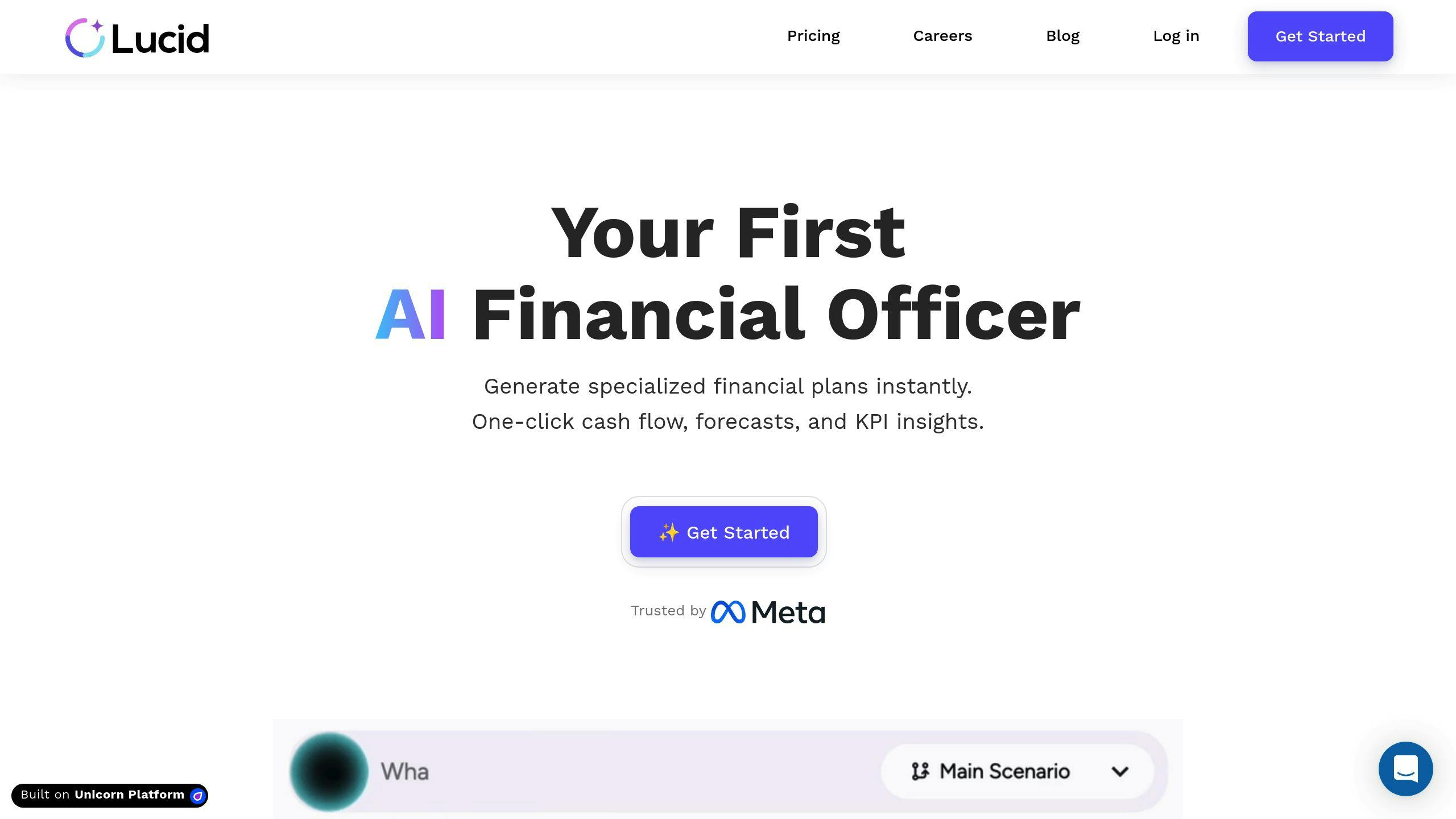AI revenue forecasting is transforming how startups predict future earnings, but it needs to be done ethically to build trust and ensure fairness. Here’s how startups can approach it responsibly:
- Protect Data Privacy: Use encryption, access controls, and comply with regulations like GDPR to safeguard customer and financial data.
- Reduce Bias: Train on diverse datasets, conduct regular audits, and educate teams to avoid unfair outcomes.
- Ensure Transparency: Make AI decisions clear, document methods, and communicate openly with stakeholders.
- Choose Ethical Tools: Select platforms with features like bias detection, explainable AI, and compliance support.
Navigating AI Ethics and Bias: A Guide for Startup Founders
Ethical Principles in AI Revenue Forecasting
Startups with limited resources need to focus on building AI systems that are secure, fair, and easy to understand. These principles not only tackle challenges in AI revenue forecasting but also help earn trust from stakeholders.
Protecting Data Privacy and Security
Keeping data private and secure is a cornerstone of ethical AI practices. Startups can use the following measures to safeguard financial and customer data:
| Security Measure | Purpose | Implementation |
|---|---|---|
| Data Encryption | Safeguard sensitive data | Use end-to-end encryption for all records |
| Access Controls | Limit unnecessary exposure | Set role-based permissions and authentication |
| Compliance Monitoring | Meet legal standards | Conduct regular GDPR and industry audits |
In addition to protecting data, startups also need to ensure their AI systems produce fair and unbiased results.
Avoiding Bias in AI Models
Bias in AI models can lead to unfair outcomes. Startups can address this by:
- Collecting Representative Data: Use training data that reflects a variety of market segments and scenarios.
- Conducting Regular Audits: Perform routine checks to identify and minimize algorithmic bias.
- Team Training: Educate teams to recognize and counteract unconscious bias in AI development.
"AI forecasting must be conducted ethically, considering issues like data privacy, bias, and fairness. Businesses must ensure that their AI models are transparent, unbiased, and respect user privacy." - Experion Global, AI Business Forecasting: A Comprehensive Guide [1]
While reducing bias is crucial, making AI decisions understandable and transparent is just as important.
Ensuring Transparency and Interpretability
For stakeholders to trust AI systems, transparency is key. Startups can achieve this by:
- Making AI decisions clear and accessible to non-technical stakeholders.
- Documenting methodologies and regularly sharing updates on model performance.
- Keeping open communication channels with all stakeholders.
sbb-itb-17e8ec9
Steps for Ethical AI Revenue Forecasting
Responsible Data Sourcing and Preparation
Startups need to prioritize ethical and high-quality data collection by following clear data governance practices and adhering to privacy regulations.
| Data Preparation Step | Implementation Guide | Ethical Consideration |
|---|---|---|
| Data Collection | Gain explicit consent for data usage | Protect user privacy and rights |
| Data Cleaning | Address outliers and missing values to ensure unbiased results | Preserve data integrity |
| Data Organization | Maintain consistent data structure | Enable traceability and accountability |
Once the data is ethically prepared, the next step is selecting and training an AI model that aligns with both technical needs and ethical principles.
Choosing and Training AI Models
The choice of AI models should focus on balancing technical requirements with ethical priorities like transparency and fairness.
"AI product ethicality benefits from training programmers and other non-technical decision makers, like managers, in the firm. Guidance from technology firms reinforces the need to train programmers to recognize algorithmic bias and to educate managers about the potential risks of using AI outcomes in decision-making." [2]
Key areas to address:
- Model Selection: Opt for models that provide clear and understandable predictions, such as linear regression.
- Documentation: Keep detailed records of training methods and model configurations to ensure transparency.
Once the model is in place, ongoing monitoring is essential to maintain both performance and ethical standards.
Monitoring and Updating AI Performance
To ensure long-term ethical and effective AI forecasting, startups should regularly assess and refine their systems. This includes tracking performance and addressing challenges such as limited resources or stakeholder concerns.
- Performance Metrics: Measure both technical factors (like accuracy) and ethical aspects (such as fairness and transparency).
- Update Protocols: Set up retraining schedules, validate new data, and communicate updates clearly with stakeholders.
Ethical AI forecasting isn't a one-time task - it demands continuous oversight. By following these structured steps and maintaining vigilant monitoring, startups can create reliable forecasting systems that meet business goals while staying true to ethical values.
Tools for Ethical AI Revenue Forecasting
Choosing the right tools for AI revenue forecasting isn't just about accuracy - it’s also about upholding ethical standards. Many modern platforms now include features that address ethical concerns while providing reliable forecasting results.
Lucid Financials

Here’s what makes Lucid Financials stand out:
| Feature Category | Ethical Approach | Business Benefit |
|---|---|---|
| Data Integration | Securely connects with QuickBooks, payroll systems, and banks | Protects sensitive data |
| Real-time Monitoring | Continuously tracks model performance | Quickly identifies and mitigates bias |
| Scenario Planning | Offers multiple forecast scenarios with clear assumptions | Helps make well-informed decisions |
| Industry Benchmarks | Provides comparisons with similar businesses | Adds market context to reduce potential bias |
The Professional plan, starting at $150/month, includes unlimited scenario planning and advanced data integration options.
Selecting Tools for Ethical Compliance
With 58% of AI startups prioritizing ethical AI policies, integrating these principles into tool selection has become essential [2]. Key considerations include:
| Criteria | What It Means | How to Verify |
|---|---|---|
| Data Privacy | Ensures secure data handling and storage | Look for encryption and strong access controls |
| Model Transparency | Clearly explains how AI makes decisions | Check for explainable AI features and documentation |
| Bias Detection | Identifies and mitigates algorithmic bias | Verify tools include automated bias audits |
| Compliance Features | Helps meet regulatory standards | Confirm the platform supports compliance requirements |
When adopting these tools, it’s crucial to focus on platforms that provide thorough training materials and detailed documentation. This ensures teams can use the tools responsibly and effectively across the organization.
Conclusion: Ethical AI Revenue Forecasting Practices
Key Points for Startups
AI revenue forecasting requires a strong ethical foundation. Recent studies reveal that 55% of C-level executives see ethical guidelines as directly tied to revenue growth, and 47% believe they improve brand reputation and trust in the marketplace [3].
For startups, focusing on data privacy, reducing bias, and ensuring transparency is critical for building trust and delivering accurate forecasts. These core principles can be implemented effectively:
| Ethical Pillar | How to Implement | Impact on Business |
|---|---|---|
| Data Privacy | Use encryption and strict access controls | Strengthens customer trust and aligns with regulations |
| Bias Mitigation | Perform regular audits and use diverse data | Leads to more reliable and fair forecasting |
| Transparency | Provide clear documentation and explainable AI tools | Boosts confidence among stakeholders |
These practices lay the groundwork for ethical AI forecasting, but advancements in technology are continually reshaping the field.
Future Developments in Ethical AI Forecasting
The role of ethical AI in financial planning is evolving rapidly. Here are some notable trends:
- Advanced Learning Models: New AI systems are capable of generating accurate forecasts with smaller datasets, reducing privacy risks without sacrificing precision [1].
- IoT Integration: Data from IoT devices adds depth to forecasting but also introduces new challenges. Strong data governance is essential to address these issues [2].
- Blockchain Integration: Combining AI with blockchain improves transparency and makes AI decisions more secure and auditable [1].
To stay competitive while upholding ethical standards, startups should:
- Regularly conduct ethical audits and share findings openly
- Train teams on ethical AI practices and stay updated on new guidelines


